These Faculty Books Will Make Terrific Holiday Gifts
Fiction, nonfiction, memoir, art history, astronomy, neuroscience—we’ve got you covered with this diverse list of books.
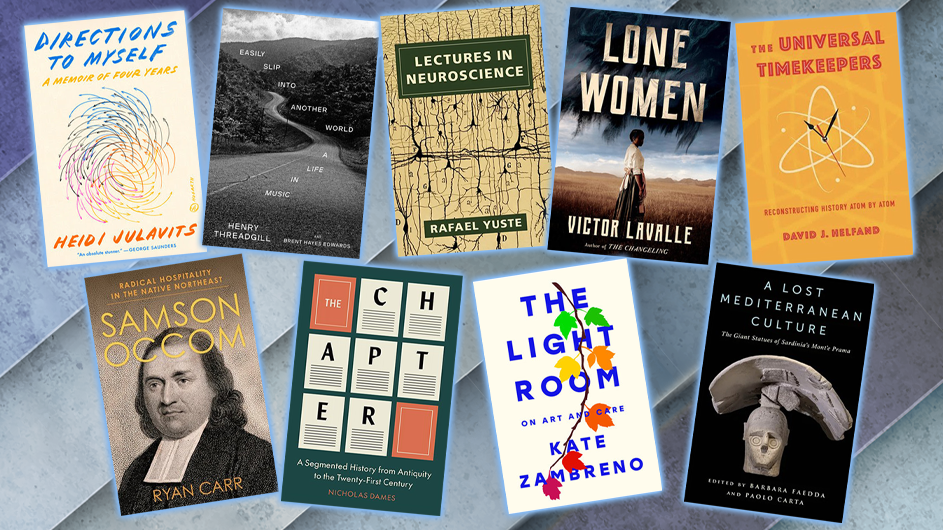
From Nicholas Dames's The Chapter, in which he traces the long history of an ancient editorial technique that morphed over centuries into a component of narrative art and a means of registering time, to The Universal Timekeepers, David Helfand's reconstruction of the history of the universe with the help of atoms; Heidi Julavits's Directions to Myself, a memoir about raising her son; and Lone Women, Victor LaValle's novel about early-20th-century homesteaders in Montana with secrets, Columbia faculty have published wide-ranging books in 2023. Here is a sampling, all of them great gift ideas for this holiday season.
Samson Occom: Radical Hospitality in the Native Northeast
By Ryan Carr
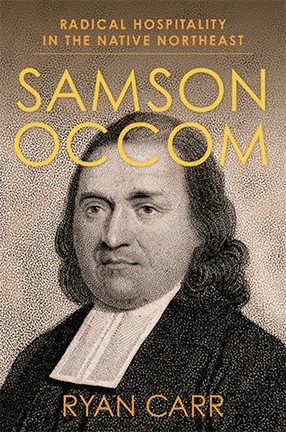
Samson Occom (1723-1792) was a prominent political and religious leader of the Indigenous peoples of New York and New England, among whom he is still revered today. Samson Occom: Radical Hospitality in the Native Northeast by Ryan Carr, a lecturer in English and comparative literature and American studies, profiles the Mohegan-Brothertown minister. An international celebrity in his time, Occom rose to fame as the first Native person to be ordained a minister in the New England colonies. In the 1770s, he helped found the nation of Brothertown, where Coastal Algonquian families seeking respite from colonialism built a new life on land given to them by the Oneida Nation. Occom was probably the most prolific Native American writer prior to the late 19th century. Most of his writings, however, have been overlooked, partly because many of them are about Christian themes that seem unrelated to Native life. In his book, Carr argues that Occom’s writings were rooted in Indigenous traditions of hospitality, diplomacy, and openness to strangers. For Occom, evangelical Christianity was not a foreign culture, but a new opportunity to practice his people’s ancestral customs. Carr demonstrates Occom’s originality as a religious thinker, showing how his commitment to Native sovereignty shaped his reading of the Bible. By emphasizing the Native sources of Occom’s evangelicalism, Carr offers new ways to understand the relations of Northeast Native traditions to Christianity, colonialism, and Indigenous self-determination.
Read a Columbia News interview with Ryan Carr about the book.
The Chapter: A Segmented History from Antiquity to the Twenty-First Century
By Nicholas Dames
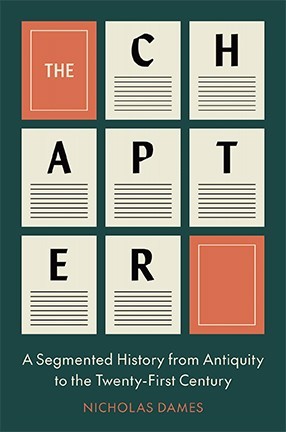
The Chapter: A Segmented History From Antiquity to the Twenty-First Century, by Nicholas Dames, the Theodore Kahan Professor of Humanities, embarks on a literary journey spanning two millennia, revealing how an ancient editorial technique became a universally recognized component of narrative art and a means to register the sensation of time. Dames begins with the textual compilations of antiquity, where chapters evolved as a tool to organize information. He moves on to the earliest divisional systems of the Gospels and the segmentation of medieval romances, describing how the chapter took on new purpose when applied to narrative texts, and how narrative segmentation gave rise to a host of aesthetic techniques. Dames discusses writers ranging from Sterne, Goethe, Tolstoy, and Dickens to George Eliot, Machado de Assis, and Jennifer Egan. Spanning ancient tablets and scrolls to contemporary fiction and film, The Chapter provides a history of a familiar compositional mode that readers often take for granted.
Read a Columbia News interview with Professor Dames about the book.
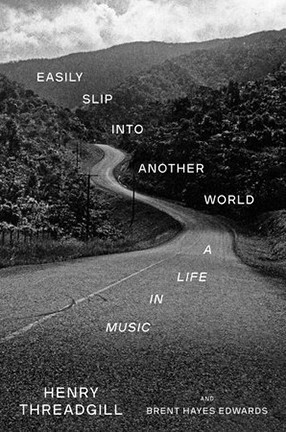
Easily Slip Into Another World: A Life in Music
By Brent Hayes Edwards and Henry Threadgill
Henry Threadgill has had a singular life in music. At 79, the saxophonist, flutist, and composer is one of three jazz artists (along with Ornette Coleman and Wynton Marsalis) to have won a Pulitzer Prize. In his autobiography, Easily Slip Into Another World, written with Brent Hayes Edwards, the Peng Family Professor of English and Comparative Literature, Threadgill recalls his Chicago childhood, his family life and education, and his musical career.
Recollections range from the music scene in Chicago in the early 1960s to his time touring with an evangelical preacher; his military service in Vietnam (representative of an under-recognized aspect of jazz history, given the number of musicians in Threadgill’s generation who served in the armed forces) to the global travels that enriched his art; to his immersion in the downtown scene of New York City in the 1970s and 1980s, when he collaborated with choreographers, writers, and theater directors, as well as a wide range of musicians. Threadgill also shares his thoughts on the recording industry, music education, and the history of Black music in the United States, as well as his work with the various ensembles he has directed over the past five decades.
Read a Columbia News interview with Professor Edwards about the book.
A Lost Mediterranean Culture: The Giant Statues of Sardinia's Mont'e Prama
Edited by Barbara Faedda and Paolo Carta
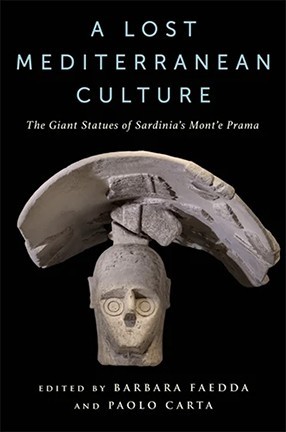
Thousands of shattered limestone pieces, dating from about 900-750 BCE, came to light in 1974 at the Mont’e Prama site in western Sardinia. They have been reassembled into dozens of colossal statues, which reward close study by archaeologists, historians, conservators, and restorers. The statues and the individual tombs in this monumental necropolis—sculpted by a powerful Mediterranean civilization—make Mont’e Prama a rich representation of a Bronze Age and Iron Age culture. A Lost Mediterranean Culture—co-edited by Barbara Faedda, executive director of the Italian Academy and adjunct professor in the Italian Department, and Paolo Carta, a professor at the University of Trento—is the first English-language book to explore Mont’e Prama’s giant statues. They are among the most important archaeological discoveries of the last 50 years and the source of fresh discoveries even today. The book, written by the leading excavators and restorers of Mont’e Prama, recounts the history of scholarship on the artifacts, and describes the landscape, the context, and the restoration efforts. Also addressed is the illicit trafficking of Sardinian cultural property.
Read a Columbia News interview with Professor Faedda about the book.
The Universal Timekeepers: Reconstructing History Atom by Atom
By David Helfand
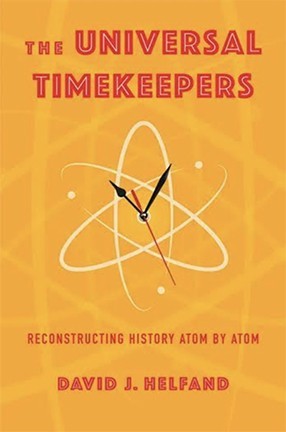
In The Universal Timekeepers, Astronomy Professor David Helfand (who has taught at Columbia for 46 years, half that time as chair of the Astronomy Department) reconstructs the history of the universe—back to its first microsecond 13.8 billion years ago—with the help of atoms. He shows how, by using detectors and reactors, microscopes and telescopes, questions such as these can be answered: Is a medieval illustrated prayer book real or forged? What was the earth’s climate like before humans emerged? Where are the clues to identify the culprit in the demise of the dinosaurs? When did our planet and solar system form? Can we trace the births of atoms in the cores of massive stars or even glimpse the origins of the universe itself?
Read a Columbia News interview with Professor Helfand about the book.
Directions to Myself: A Memoir of Four Years
By Heidi Julavits
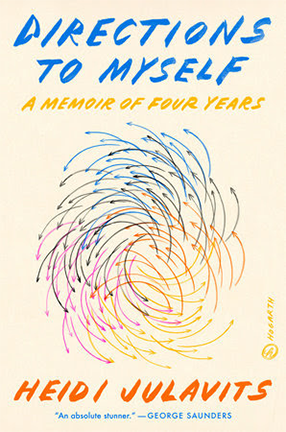
One summer, Heidi Julavits, a professor in the Writing Program at the School of the Arts, saw her son silhouetted by the sun and noticed that he was at the threshold of what she called “the end times of childhood.” When did this happen, she asks herself, in her new memoir, Directions to Myself. Who is my son becoming, and what qualifies me to be his guide? The next four years felt to her like uncharted waters. Rape allegations occurred at Columbia, unleashing questions of justice and accountability, as well as education and prevention. Julavits wondered how to prepare her son to be the best possible citizen of the world he was about to enter, and what she must learn about herself to responsibly steer him. In the book, she looks back to her childhood in Maine, where she and her family often navigated the tricky coastline in a small boat, relying on a decades-old nautical guide, and conducts an intellectual navigation of the self. Throughout, she intertwines her internal analysis with an exploration of what it means to raise a child in a time full of contradictions and moral complexity.
Read a Columbia News interview with Professor Julavits about the book.
Lone Women
By Victor LaValle
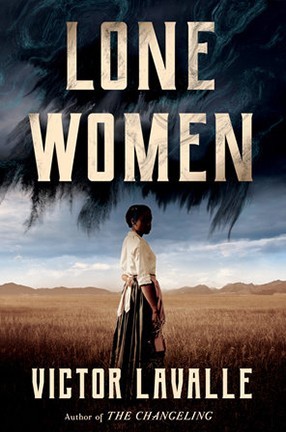
Lone Women, a new novel by School of the Arts Writing Professor Victor LaValle, takes place in 1915 and focuses on Adelaide Henry. She carries an enormous locked steamer trunk with her wherever she goes. Adelaide has a secret sin, which killed her parents, forcing her to flee California in a rush and make her way to Montana as a homesteader. Dragging the trunk with her at every stop, Adelaide will become one of the “lone women,” taking advantage of the government’s offer of free land for those who can tame it—except that Adelaide isn’t alone. And the secret she’s tried so desperately to lock away might be the only thing that will help her survive the harsh territory. Lone Women blends a cast of adventurers who find horror and sisterhood in early-20th-century America.
Read a Columbia News interview with Professor LaValle about the book.
Lectures in Neuroscience
By Rafael Yuste
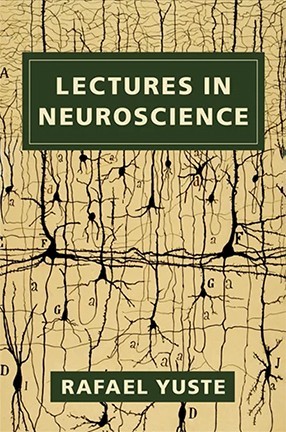
In Lectures in Neuroscience, Rafael Yuste, a professor of biological sciences and director of the NeuroTechnology Center, provides an accessible introduction to the brain. Beginning with basic elements of neuroscience, he guides readers through increasingly sophisticated topics, developing a unified framework for how the brain functions. Yuste describes how the brain is organized and how it develops, how neurons operate and form neural circuits, and how these circuits function as neural networks to generate behavior and mental states. Yuste challenges the traditional view that the brain is an input-output machine that reacts reflexively to sensory stimuli. Instead, he argues, the purpose of the brain is to make a predictive model of the world in order to anticipate the future and choose successful courses of action. He offers insights into the workings of sensory and motor systems and the neurobiological basis of our perceptions, thoughts, emotions, memories, and consciousness.
Read a Columbia News interview with Professor Yuste about the book.
The Light Room: On Art and Care
By Kate Zambreno
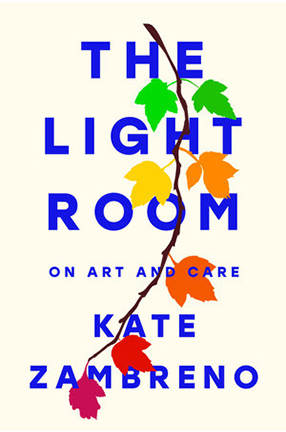
The Light Room, the new book by Kate Zambreno, an adjunct associate writing professor at the School of the Arts, is a chronicle of life as the mother of two young daughters in a moment of profound uncertainty about public health, climate change, and the future. Moving through the seasons, returning often to parks and other green spaces, Zambreno captures the isolation and exhaustion of being home with a baby and a small child, as well as the moments of beauty and joy. In the book, she is inspired by writers and artists ranging from Natalia Ginzburg to Joseph Cornell, Yūko Tsushima to Bernadette Mayer, Etel Adnan to David Wojnarowicz. She questions how memories will be affected by this time of disconnection, asks what it means to bring new life—and new work—into this moment of precarity and crisis, and, finally, offers hope and possibility.
Read a Columbia News interview with Professor Zambreno about the book.